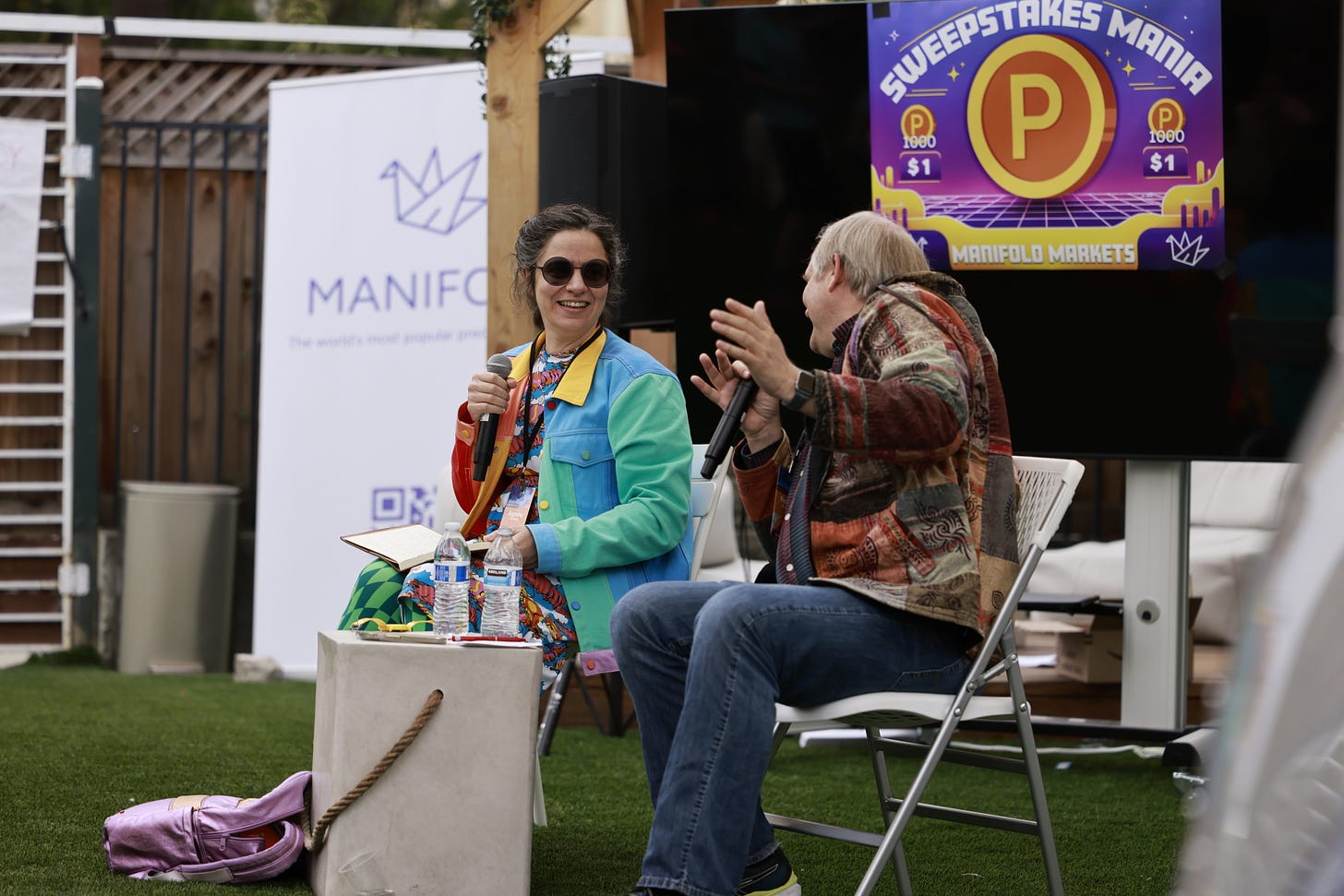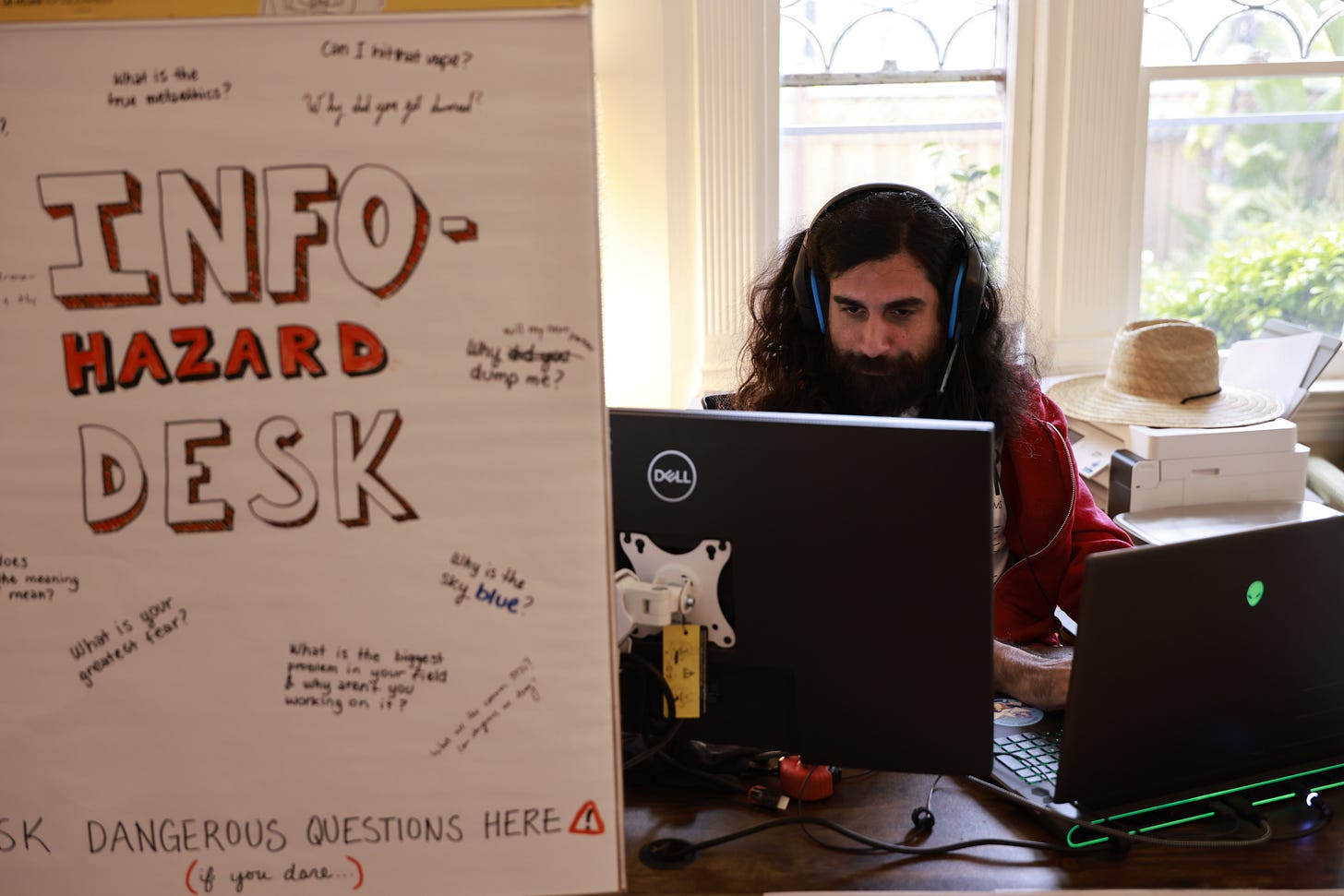Manifest 2024 was last weekend. Manifest is a tough event to describe: sometimes we call it a festival, sometimes a conference. Last year we said it was about prediction markets and forecasting, but then it covered a bunch of other random stuff. This year we tried to be more honest (and cute) and said it was about predictions, markets, and mechanisms — this means Razib Khan talking about the future of genomics counts, Byrne Hobart talking about discount rates counts, Jay Baxter talking about Community Notes counts. But then what about Agnes Callard and Robin Hanson arguing about humanist vs. science and tech culture?
Steve Hsu called it “Woodstock for nerds”. Austin says it’s “halfway between EAG and Vibecamp”.1 I’ve described it as a “festival for the (micro)economically literate”.
I dunno, you had to be there.
Some lovely writers have written some lovely pieces describing their experiences there. See Bentham’s Bulldog, Byrne Hobart, Theo Jaffee, Tracing Woodgrains, and Cremieux. These are immensely flattering to read, but they don’t quite resonate with me, because the experience they describe as attendees is of course nothing like my experience as an organizer. So I wanted to write my own glowing review of Manifest, from a very different angle: a glowing review of what it was like to make Manifest happen.
The planning process
Event planning is a particularly fun job day-to-day.
Tasks are so varied. Some pieces that I got to spend lots of time with were building our main website, writing broad attendee comms, organizing our Airtable and building automations, collecting and making and ordering merch designs, building a scheduling app, communicating with speakers about their content, playing scheduling tetris, plus a bunch of other tiny things. I got to be an engineer, a designer, a manager, a communicator, an operator. It doesn’t get boring!2
Tasks are often small and discrete. Each day, I get stuff done. Each time a design comes in, a detail gets announced, a speaker confirms they’ll come, I get to check off a little box and be one step closer to ready.
It’s motivating to work towards a single final product, and then be done. This is in contrast to the work I’d been doing for the previous year at Manifund, where there was always a lot of uncertainty over what we were going to do next and why. We’re like, trying to nudge the EA funding ecosystem in a positive direction or something? But we’re working blind and feedback loops are slow and I’m always a little afraid we’re screwing up horribly. For Manifest, we’re just trying to get a few hundred people to physically show up to a place and do stuff for a few days. It’s so concrete, so rewarding.
Then of course, there’s the team.
Austin is great, I love Austin, he’s my favorite person ever. Obviously. I’ve been working with him for the past year, and enjoyed continuing to work with him. I could write a separate post about this, but briefly, working with your spouse is so underrated. Mostly the same qualities that make someone a great coworker make them a great partner: mutual trust, good communication, shared values. Much of a marriage is like working together: making decisions about finances and living arrangements, sharing a schedule, changing diapers — none of these parts of marriage are well-tested by romantic nights out. They’re well-tested by working together. Austin and I met working together (at a different conference, in fact), and we worked together a bunch more before getting married. We work really well together, which was a big part of why I felt so confident about marrying him, and why I feel so confident now he’ll be a great father and coparent to our children. His roles as “best possible coworker” and “best possible husband” are inseparable to me. Plus, it’s nice that when we’re really excited about work stuff, we can share that with each other. As I write this, we’re on a brief post-Manifest vacation, which we spent most of the ride to excitedly discussing the future of Manifest and other events we could run together.
What’s so great about working with (and being married to) Austin? In addition to being smart and hardworking and all the rest, he’s kind of crazy. He has some principles, which he takes unusually seriously. Relevant to Manifest: all people should be invited3, all attendees should contribute, all activities should be allowed, all information should be public, all stuff should get done and shipped asap. He has a big personality: he is both extremely wholesome and kind and wildly confident and stubborn. All of this amounts to him having a strong sense of taste that shapes Manifest into the unique event that it is. He’s why all of our notes are public, why we host such an unusual balance of whimsy and seriousness, how we gather the amazing set of people we do.
Perhaps because he is insane himself, he tolerates and encourages a bit of insanity in his teammates as well. Saul and I are 20 and 21 respectively, which means we can be naive: we have high hopes and a tendency to bite off more than we can chew. Or at least, most experienced 29-year-olds would have said we were biting off more than we could chew, whereas Austin correctly recognizes our naive ambition for the superpower it is. So when I say I want to build our scheduling app from scratch because the alternatives are bad, or Saul says he wants to work full time at a different conference the weekend prior so we can learn from it, Austin tells us to go for it (often after telling us that this is insane). And these choices really pay off.
So that brings us to Saul. Naive ambition is just one of Saul’s superpowers.
An aside: I sometimes brisk at the word “competence”. It’s a trait referenced a lot in my Bay Area circles, in a way that sometimes feels in-group-y and status-y. It’s long been a bit mysterious to me, which has at times fed my insecurity: what does it even mean to be “competent”, beyond being smart and hardworking? Do I have this magical quality that my community seems to equate with being valuable and good?
Still, I can think of no better way to say this: Saul is really competent. I trust him a lot. He gets shit done. He gets it done well.
The competence thing comes through most when things aren’t going quite right — when a decision is being made too hastily, or too slowly; when an important thing might not get done on time; when there’s a small chance of something going significantly wrong. In these moments, Saul is often the first to notice and to point it out. He notices when he’s confused or concerned and doesn’t instinctively brush it under the rug, but takes action immediately. He says in big meetings “I don’t think this is worth investing more time in,” or “let’s talk about this 1-1 afterwards”. He frequently starts 30 second or 2 minute timers on his phone so we can think and make sure we’re not forgetting anything — and often we are forgetting something! He is the king of “strong opinions, weakly held”: he’s quick to bring up disagreements with me or Austin — if he thinks we have security holes or have chosen the wrong work hours for support staff or have scheduled something weirdly — but then he’s just as quick to change his mind when our discussion calls for it. All of this happens a thousand times, in tiny ways, where no particular instance matters that much, but all-in-all it adds up.
His attentiveness extends to the people around him as well. As I’ve gone through Manifest feedback, it’s been salient to me that there’s a huge category of things that people will complain about if they are bad, but hardly take notice of if they are good: events starting on time, readable schedule and signage, A/V, even the weather. Saul is unusual in that he does notice when easy-to-miss things are going well and who is responsible, and he makes sure to thank them. I admire this a lot.
And of course, in addition to what they bring to the table skill-wise, I just like Saul and Austin. We get along, we share a lot of values and sensibilities. Working with them has truly been a goddamn blessing from heaven.
The buildup
In the week before the event, the hype builds steeply. There’s a calm-before-the-storm feeling. There’s a dissonance, like it’s hard to believe that in just a few days, five hundred people are going to show up and the thing you’ve been planning for months is going to happen and it may be a hit or a disaster, but at this point almost all the work is behind you and it’s just going to happen either way.
This is where I get a little manic. Hypomanic — the good kind of mania. Despite my best efforts I can’t sleep past sunrise. As soon as my eyes open and see light, I’m drawn to work. For the last couple years I’ve been a cup-of-coffee-a-day girl,4 but in this last week I forget it half the time. I’m buzzing.
And there’s still so much to do! The venue isn’t set up right, it’s been arranged for a (still ongoing) different event. There’s no signage. Sessions are still moving around on the schedule. A few speakers still haven’t confirmed what they’re doing with their slots. I’m still missing MCs for a bunch of talks, and even the ones I have confirmed I haven’t actually told what to do yet. The volunteer guide isn’t ready and training starts tomorrow! Name badges haven’t arrived, though there’s really nothing to do about that except worry. People keep buying tickets, which means we’re going to run out of food, and the caterers are being slow to reply. AHHHHH!
But I kinda know it’s all going to work out. It’s like in school, when I had a daunting project that I’d been procrastinating on, and part of me couldn’t imagine doing it but I knew from experience that I always did get this stuff done, so somehow future Rachel would get her act together and just do it and everything would be fine.
Similarly, I knew that somehow, by force of will, we would get everything done and people would show up and it would not be a mess. And of course, that’s what happened.
The conference itself
At the beginning of a big event, there’s a great letting go.
Three people really can’t know what’s going on everywhere at all times at a six hundred person festival. Almost everything that needs to get done during the event is delegated, mostly to volunteers, but also to caterers, videographers, MCs, etc. We do our best to communicate clearly in advance, but once the event starts, we have very little direct control.
This is scary.
At the other big conference I helped with a few years back, the Future Forum, this transition did not go well, and I spent the whole conference running around chasing problems. Apparently that’s what Manifest was like last year, too.
This time around, it was so smooth. I repeatedly had the following interaction with other Manifest staff: we’re wandering around. We see each other, make eye contact, and start to approach. At least one of us is thinking that the other person must have a problem they’re about to share and possibly rope us into helping with. But then it’s “what’s up?” “Nothing much.” “Things are going so smoothly wtf??”
We rarely got pinged about problems, so we had time to wander, check in on sessions, notice the vibes around campus. Are things too fun, or too serious? Are sessions starting smoothly? Are rooms set up well? Do people seem happy? I expected to be firefighting. I actually like firefighting. It’s exciting. I had fun at Future Forum. But we had such amazing volunteers and ops support that we were wandering around looking for tasks to do and coming up dry.
And I’ll note here that I’m in my last month of pregnancy. We planned things so I could just hang out at registration mostly immobile, even if things were actually going wrong. But I was antsy, I wanted to see what was going on. Most nights around 9pm the lower back pain would hit and I’d slightly regret my choices, but the next day I’d be back wandering.
What drew me to wander? Allow me a moment to paint a picture: there’s this thing that happens to me, often in the first hour or so after ingesting THC, where I’m walking around or eating snacks or doing whatever one does while high and I notice that my face hurts. All of a sudden I become aware that the muscles in my cheeks have been hard at work putting a huge smile on my face for the last hour and are all exhausted and crampy. This happens to me on hikes sometimes, too. And it happened to me wandering around Manifest. It’s the too much happy chemicals feeling — nothing in particular has captured my attention to make me smile, but I’m full of joy.

The aftermath
There are a lot of strong feelings after an event like this.
One is pride: a sense of satisfaction and accomplishment after a job well done.
There’s some lingering shame, too: even when negative feedback is a small minority of all feedback, it sticks with me for days.
Another is wistfulness: it was great. Now it’s over. What’s next?
And finally, one that’s snuck up on me, is love: I feel overwhelmingly fond of many of the people I spent time with at Manifest, and broadly grateful to have so many wonderful people in my life.
You may think that’s just what happens when you spend a weekend with your community. Our most positive feedback from attendees references a similar feeling: that of having found one’s tribe, having formed intense connections with others. But I don’t think I’d feel that way after attending Manifest — I didn’t last year, when I wasn’t on the core team. I don’t generally leave parties or conferences aglow with fondness for my fellow humans. If anything, due to a trapped prior I have around meeting new people (read: social anxiety), I tend to feel better about people when I’m not meeting new ones.
But hosting is different, and working with people is different.
See, when I was a little kid, I was serious about gymnastics. I loved gymnastics. I spent my days off practicing tricks in my attic for hours on end. I loved how strong I was, how freely I could move my body. I loved the grind. But gymnastics is an individual sport: you win alone.
In high school, I was a coxswain for rowing — the small person who sits at the back of the boat and tells people what to do. The job itself is not that interesting: I was basically a middle manager/ops person/cheerleader/driver. I did not spend my Sundays practicing coxing. But sharing a win with a team is vastly better than winning alone. Even the small wins — scrimmages, or beating a higher ranked boat in one of eight pieces during a practice — are incredible. And the high after winning a big race has supplied some of the peak moments in my life.
After Manifest, I again feel as though I’ve won big with my team. I do feel aglow with fondness towards all the people who helped make it happen: the attendees, especially those who ran hit sessions; the volunteers I worked with;5 the Lighthaven team, in particular Ronny, Ehssan, Oli, Ben, Ricki, and Ray; our day-of ops supporters, Skyler and Lauren; and of course, the core team, Saul and Austin.
This experience, this feeling, seems core to life as a social animal.
Thank you to everyone who helped manifest Manifest with me :)
Which this year it literally was: EAG was the weekend before Manifest, and Vibe Camp is this weekend, the weekend after.
This is less true for more established teams that run bigger events, like EA Global. They have more people so individuals are more specialized to specific tasks. Often those individuals have been on the team for a while run the event a few of times, so there are fewer decisions to be made, and more processes to be repeated.
But if you’re a team of three running a 600-person event for the second time, there’s lots of novelty.
Austin says “I vibe a lot with Scott Alexander’s call to open up EA Global. Many great attendees wouldn’t pass an admissions screen, including my past self; I got rejected from EAG the first time I applied.”
Yes, this is fine during pregnancy, too.
Ameet, Amit, Derik, Gavriel, Gabrielle, Huw, Janna, Joe, Lauren, Malcolm, Matt, Quinn, Simon, Tess, and many others who I just had less face time with.









I wanted to say thank you so much for organizing this conference. It was a truly wonderful experience -- I hope to be there next year. :)